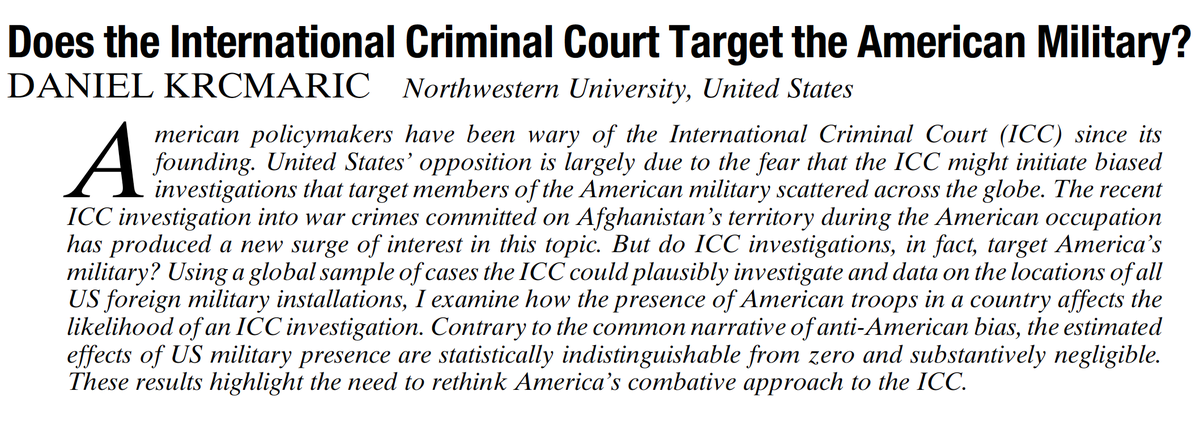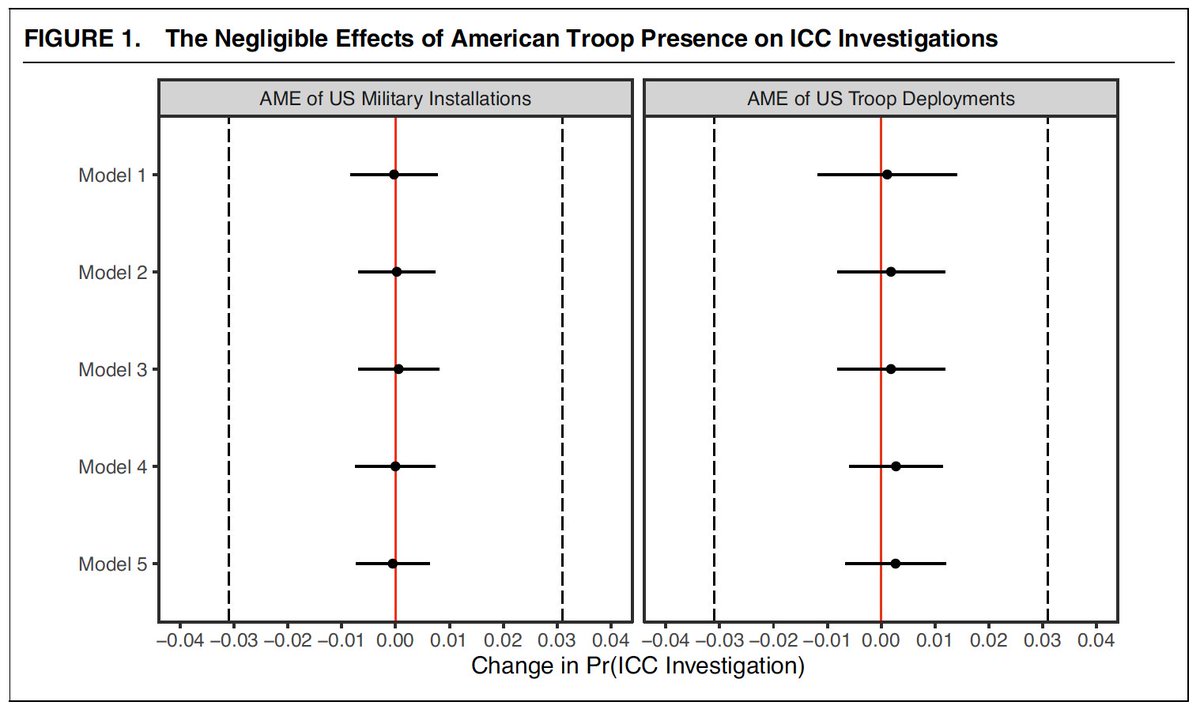
🚨New paper alert🚨
Does the International Criminal Court target the American military?
My take is now available on FirstView @apsrjournal.
A 🧵 on why you should care about US-ICC relations:
Does the International Criminal Court target the American military?
My take is now available on FirstView @apsrjournal.
A 🧵 on why you should care about US-ICC relations:

The US has been wary of the #ICC for a long time. Its basic fear is that the ICC will initiate biased investigations that target members of the American military scattered around the world. Given America’s global military presence, its troops are uniquely exposed.
US opposition to the ICC has come in many forms. During Clinton’s presidency, the US participated in the negotiations in Rome that created the ICC. But the US was just 1 of 7 states to vote against establishing the Court.
That put the US in some dubious company: The other 6 voting “no” were China, Israel, Iraq, Cuba, Syria, and Yemen. Not exactly the human rights company the US typically wants to keep.
Under Bush, the US escalated its war on the ICC. The most potent symbol of US hostility was (bipartisan) Congressional legislation nicknamed the “Hague Invasion Act.” It authorized the president to use any means necessary to liberate members of the military imprisoned by the ICC.
The US softened its stance during Bush’s second term and the Obama years. While it never considered joining the ICC, the US took some small steps to help the Court (sharing evidence, not vetoing a Security Council referral of Sudan to the ICC, etc.).
But two things upended this period of calm in the US-ICC relationship: the election of Donald Trump and the ICC’s decision to open an investigation into war crimes committed in Afghanistan during the US occupation there.
This put American soldiers, among other actors, under the Court’s microscope. Encouraged by his national security advisor John Bolton – the ICC’s nemesis since its founding – Trump imposed sanctions on the ICC.
And when it came to longstanding US fears that the ICC was politically motivated to target the American military, secretary of state Mike Pompeo concluded: “Our fears were warranted.”
washingtonpost.com/world/2019/04/…
washingtonpost.com/world/2019/04/…
But are these fears really warranted? We can’t say much about possible ICC bias from just one case. We now have two decades of data on the situations the ICC decided to investigate and — equally important — the situations the ICC decided NOT to investigate.
So I decided to check whether ICC investigations really are biased against the US. Specifically, I asked: Are ICC investigations disproportionately likely in situations that involve the American military?
To answer this question, I constructed a sample of cases the ICC might plausibly investigate. I then used geolocated data on US foreign military installations to examine how the presence of American troops in a country affects the likelihood of the ICC launching an investigation.
What did I find? A bunch of null effects. Contrary to the common narrative of anti-US bias, there is no evidence that ICC investigations target (or avoid) America’s military. 

What do my findings mean for future US-ICC relations? I offer some reasons for cautious optimism: US public opinion toward the ICC is pretty positive. And ICC advocates in the US can now point to the absence of anti-American bias in the Court’s track record.
But arguably the biggest positive change in US-ICC relations may have occurred after I finished writing my article: the ICC decided to investigate Russian crimes committed in Ukraine.
ICC critics are suddenly praising the Court. In Lindsey Graham’s words: “This is one of Putin’s bigger accomplishments. I didn’t think it was possible but he did it - and that’s for him to rehabilitate the ICC in the eyes of the Republican Party and the American people.”
See here for more about America's rapid 180 on the ICC: nytimes.com/2022/04/11/us/…
Of course, there is no guarantee that this newfound optimism about the ICC in Congress will last. The 2024 presidential election might upend things. But the US-ICC relationship is currently in a shockingly good place given how bad it was a few years ago.
Improving US-ICC relations is a big deal: the ICC will struggle to live up to its lofty goal of ending impunity without American support. Because the ICC relies on states to provide enforcement, America’s diplomatic muscle could help get wanted war criminals in the dock.
The full paper is here: doi.org/10.1017/S00030…
Please spread the word: @PoliSciatNU @BuffettInst @WeinbergCollege @NUSources @NorthwesternLaw @ABAICCProject @IntlCrimCourt
And a special thanks to the great anonymous reviewers (this is how peer review is supposed to work!) and of course @TGiftiv and @AndrewBellUS for lots of helpful conversations
• • •
Missing some Tweet in this thread? You can try to
force a refresh



